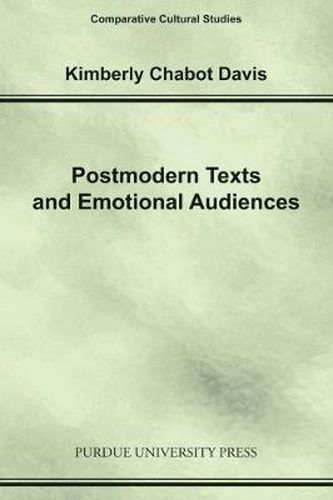Readings Newsletter
Become a Readings Member to make your shopping experience even easier.
Sign in or sign up for free!
You’re not far away from qualifying for FREE standard shipping within Australia
You’ve qualified for FREE standard shipping within Australia
The cart is loading…






In her book Postmodern Texts and Emotional Audiences , Chabot Davis analyzes contemporary texts that bond together two seemingly antithetical sensibilities: the sentimental and the postmodern. Ranging across multiple media and offering a methodological union of textual analysis and reception study, Chabot Davis presents case studies of audience responses to The Piano (film), Kiss of the Spider Woman (novel, film, and musical), and Northern Exposure (television series). Emerging in the late- 1980s and 1990s amidst public debates about identity politics and multiculturalism, these texts encouraged critical thinking about the political stakes of identity construction and resonated with audiences grappling with the postmodern critique of essentialist conceptions of the self. Chabot Davis argues that sentimental postmodernism deepened leftist political engagement by moving audiences to identify emotionally with people across the divisions of gender, sexual identity, race, and ethnicity. By focusing on postmodern melodramas that foster cross-group empathy and encourage utopian desires for a pluralistic society, this study questions the critical equation of postmodernism with apocalyptic nihilism and political apathy. The book also challenges the assumption that sentimentality and sympathy are inherently conservative and imperialistic. While identification is often viewed as a retrograde tool of popular culture, Chabot Davis’ comparative cultural and ethnographic study uncovers the capacity of identification to dislodge people from fixed and limiting identities and to work as an agent of social change.
$9.00 standard shipping within Australia
FREE standard shipping within Australia for orders over $100.00
Express & International shipping calculated at checkout
In her book Postmodern Texts and Emotional Audiences , Chabot Davis analyzes contemporary texts that bond together two seemingly antithetical sensibilities: the sentimental and the postmodern. Ranging across multiple media and offering a methodological union of textual analysis and reception study, Chabot Davis presents case studies of audience responses to The Piano (film), Kiss of the Spider Woman (novel, film, and musical), and Northern Exposure (television series). Emerging in the late- 1980s and 1990s amidst public debates about identity politics and multiculturalism, these texts encouraged critical thinking about the political stakes of identity construction and resonated with audiences grappling with the postmodern critique of essentialist conceptions of the self. Chabot Davis argues that sentimental postmodernism deepened leftist political engagement by moving audiences to identify emotionally with people across the divisions of gender, sexual identity, race, and ethnicity. By focusing on postmodern melodramas that foster cross-group empathy and encourage utopian desires for a pluralistic society, this study questions the critical equation of postmodernism with apocalyptic nihilism and political apathy. The book also challenges the assumption that sentimentality and sympathy are inherently conservative and imperialistic. While identification is often viewed as a retrograde tool of popular culture, Chabot Davis’ comparative cultural and ethnographic study uncovers the capacity of identification to dislodge people from fixed and limiting identities and to work as an agent of social change.